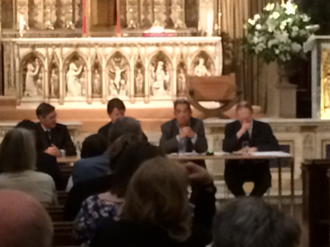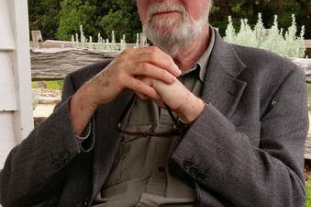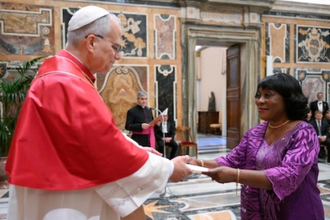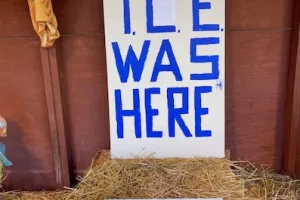Text: Dr Frank Turner SJ at Farm Street EU Referendum debate

Dr Frank Turner SJ, Fellow in Political Theology, Campion Hall, Oxford gave the following analysis at the debate on Tuesday at Farm Street Church entitled: Faith Matters Question Time - A Christian response to the EU Referendum'.
I am an academic involved in reflection on social justice from a perspective of theology and Christian social thought. I'm not a debater. So I'll make my 3-4 points as simply as possible,
The Referendum Question
The referendum asks one clear, simple question: 'Should the United Kingdom remain a member of the European Union or leave the European Union?'. My position, though, is double.
• The EU, with all kinds of necessary qualifications, is a good and necessary institution. (This is a claim about the EU itself.)
• The UK should remain a member. (To my mind, this second proposal does not make sense without the first (which the Leave campaign hotly denies, but which - unfortunately, the Government hardly defends).
Economics - Politics
I believe that the EU's idea of the 'social market economy' is more balanced, more fully human and more consistent with Christian thought, than that of the 'free market economy'. Economics (and its relationship to politics) is important and I hope we'll discuss this the economic dimension in debate, but given time limits I leave it aside now. Because even if the EU is still popularly known in Britain as the 'Common Market' the EU is not primarily an economic association. The economic structures put in place from 1950 onwards did not have the primary goal of maximising economic growth. Through political action they sought to unite the economies of the warring states in such a way that war would in future be unthinkable between them.
Remember: from 1900 to 1950, 60 million people died by violence on the continent; from 1950 to 2000 about 1 million. The EU can't claim sole credit for that: but its first purpose was to establish a structure that would soften the most destructive nationalisms of the 20th century. It has achieved this. No one thinks Britain or France will now go to war with Germany or Italy.
That peace dynamic still operates. The EU integrated several countries emerging from the Soviet system into the EU not for economic reasons (the EU became more economically vulnerable as a result) but to incorporate what Pope John Paul called 'the two lungs of Europe'. In this way the significantly enabled the post-Soviet political reconstruction of Europe. Peace in Europe trumped economics.
Sovereignty
20th c. nationalism persists. It appeals to the principle of state sovereignty. China's claim, for instance, that any outside intervention in its internal affairs (to defend human rights, or press freedom) is 'interference with its sovereignty', turns the state into an unchallengeable ultimate (that is, theologically speaking, an 'idol'). On the contrary, states have obligations beyond themselves: by international and humanitarian law, by treaty, and by the sheer reality of human interdependence and human need.
The UK is not inherently isolationalist. It is proud of the 'special relationship' with the USA. Its traditional structure of partnership has been the Commonwealth, which explains some of the original opposition to joining the EU. The UK is commendably generous in maintaining its level of support for the global development goals. Yet when it comes to the EU I fear we bring the nationalist perspective with great force. In Westminster you would regularly hear a question about how some EU policy affects the UK. You would never hear anyone ask how some proposed UK policy would affect the EU. [Examples - Turkey - in debate if you wish.]
The founders of the EU believed that shared sovereignty (which involves a measure of willingness to moderate unilateral demands) is not loss, but enrichment. I think many Britons, and their government, assume that shared sovereignty is lost sovereignty. They take sovereignty to be a zero-sum game. I do not believe that. In fact, the EU combines the modes of shared sovereignty, and member-state sovereignty. Its 'competences' are limited. In its institutional balance, the Commission, the civil service, serves the EU as a whole. The nationally elected Parliament embodies representative democracy, and in the Council, Leaders and other ministers represents the states themselves, in both partnership and competition. (Significantly, the UK prefer to work through the Council.)
I have a second point about sovereignty, that in a globalised world, effective national sovereignty, for a state such as the UK, is almost a fiction.
Regardless of how the referendum turns out, I believe the negotiation process is deeply negative. The public debate has focused on fierce arguments about direct economic cost-benefit, of British interests alone.
The Government's leaflet, issued last month to every UK household begins 'The UK has secured a special status (emphasis in original) in a reformed EU'.
• we will not join the Euro;
• we will keep our own border controls;
• the UK will not be part of further European political integration;
• there will be tough new restrictions on access to our welfare system for new EU migrants;
• we have a commitment to reduce EU red tape
Al these points are negative. Some of them seem demeaning. (What the UK regards as 'red tape' may include vital regulations on environmental protection, food safety, labour rights, etc.)
This is where Christian thought might have a clear ethical contribution (not a contribution unique to Christianity, of course).
At a personal level, the attitude of existing in a state of permanent dissatisfaction, of always wanting more, poisons relationships and the springs of joy.
I admire many politicians and don't regard the life of politics as a sphere where we are content to operate our worst selves, and I am sad that the British debate embodies this bitterness, this lack of generosity and openness to others.
I don't want a special status in the EU, I want equal status. The Government asks not how can we gain an fair agreement, but how can 'we' gain over against everyone else. I find myself in a strange position, since the Government argues for the position I strongly support, the UK's continued membership, for reasons that I don't like at all. Staying in, seeking a combination of maximum benefits for ourselves and minimum commitment to others, is not what I want, and that attitude if generalised would eventually destroy the EU whether we stay or leave. I hope we stay in, for our own sake and for the sake of the EU. But I also hope we are willing to be a different kind of member, sharing both benefits and costs. I want us to seek the good of the EU in which the UK's own good is included.
See also: ICN Wednesday 8 June 2016 - London: Brexit debate at Farm Street www.indcatholicnews.com/news.php?viewStory=30244


















